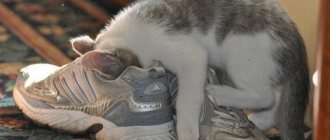When cats hiss at kittens
Watching a cat hissing at kittens, you can notice that often its visible aggression in this case is a kind of lesson. It is not uncommon for babies to be trained in the form of outwardly aggressive play, in which mother and kittens mutually attack each other. In this way, babies gain the skills they need in the future to defend themselves and provide food for themselves.
© shutterstock
When playing, the cat growls, hisses and looks very intimidating, but her aggression is not directed against the kittens, she tries to recreate possible life situations. You should not interfere with their game. If you try to take the cub, the mother may hiss at you. This defense of the kittens by hissing is her natural reaction in the current situation.
Main reasons
Manifestation of fear
If a cat constantly growls at a certain person, this may indicate that the pet is afraid of him. Similar sensations are typical for representatives of the cat family who have an insufficient level of socialization or are oppressed by their owners and show aggression. When a cat or dog yells, hisses and bites out of fear, this can be recognized by a number of additional signs:
- attack on people or a cat on its kitten under the influence of an irritant;
- growling, in which the pet can sharply hit with its paw;
- increased hissing when hitting a corner;
- unusual poses for the animal;
- constant licking of fur.
Veterinarians note that some cats develop fear from an early age, so such pets should pay special attention, do not punish or scold them, and be patient.
Frustration: what is it?
Hissing in kittens is usually caused by distrust of people when they were weaned from their mother's milk early.
If a cat hides and hisses into the void, then this may indicate a similar condition in which the animal’s desires are at odds with its capabilities. Zoologists note that kittens that are weaned early from the cat's breast are more likely to become frustrated. Such individuals are often unable to find food on their own and need to be fed, and if this does not happen, they become aggressive, rush at a person and hiss. When frustrated, a cat stands out in other ways:
- hissing at strangers in whom there is no trust;
- growling if the cat is not given treats;
- pets scream loudly and rush around the doors.
Predator instinct
Cat hissing can occur in domestic and wild animals, since this is how special instincts are manifested. If this instinct awakens in a pet, then it can become a real aggressor. It is not recommended to play with a cat in such a way that it follows the owner’s hand or foot under the blanket. Soon the animal will begin to attack children and adults for no reason. If, under the influence of the predator instinct, the cat hisses at the owner, then he can also grab the legs from ambush. The pet, as a rule, does not react to the owner’s remark and scratches with particular viciousness.
How is dominance demonstrated?
When moving into a new home, it is important to show the cat who is dominant, otherwise she will do it.
When they get to a new home, little kittens try to take a leading position and influence the household members so that they have the same opinion. When a guest or other stranger tries to enter his territory, the cat begins to hiss, throw himself, or scratch himself. Therefore, it is extremely important from the first days to raise a pet so that it is subordinate to the owner, and not vice versa. One of the people must be recognized as the dominant, and often the animal may feel jealous of its chosen one.
Provocateur games
Often a cat hisses and growls at the owner while flirting, and this reason is not uncommon for aggression on the part of the animal. Veterinarians do not recommend playing with a pet from early childhood in such a way that it throws itself on its legs or arms, since such a reflex can later pose a danger to humans.
If a black cat hisses during a provocative game, then it is strictly forbidden to swear at it or physically punish it. In this case, it is recommended to leave the room for a while, leaving the pet alone until it calms down.
Defending your own territory
If strangers invade the pet’s territory, it shows aggression in order to protect its possessions.
The cat hisses and attacks guests or the owner in order to protect its possessions. The pet immediately identifies the most convenient places in the house, which it tries to defend in every possible way. The British cat and other representatives of the cat family are especially aggressive if a person comes from another place and there is a foreign smell on his things. For a pet, this means an intrusion into the territory by a stranger.
Social aggression: what is it associated with?
A black cat growls and hisses at its owner if the owner annoys him with increased attention and excessive affection. Representatives of the cat family tend to behave coolly, and, if necessary, can themselves demand tenderness from the owner. Cats believe that gentle treatment should be dosed, and if it is more than required, then the pet arches or hisses.
Why was the cat offended?
When offended, a pet often gets angry and growls, and such emotions appear automatically. The owner is advised to remember exactly where he committed offense towards the pet. A cat can show its displeasure by hissing at the offender, or completely ignoring him. It is worth communicating with your pet so that resentment does not accumulate and the cat does not show even greater aggression.
Possible diseases
The growling of an animal occurs when there is pain, for example, when a cat is severely poisoned.
A sick animal may experience pain day and night and additional unpleasant symptoms that cause him anxiety. A cat growls and hisses at its owner or another member of the cat family with the following diseases:
- epilepsy;
- urolithiasis;
- severe poisoning;
- hormonal disbalance;
- mechanical damage to the limbs or internal organs;
- toxoplasmosis.
Other reasons
If a kitten or adult cat hisses, this does not always mean that he is offended. When a pet chews its tail at night or during the day, this may indicate some kind of disorder. The following factors can influence this condition:
- change of housing;
- the appearance of a newborn in the house;
- reduced attention from the owner or complete absence;
- psychological trauma.
If the owners breed felines and there is a cat and a cat living in the apartment, then when the female becomes pregnant, the pets often hiss at each other. In this way, the animal manifests its maternal instinct, which helps preserve its offspring. If the cat was previously ill and underwent surgery, then after anesthesia the pet is able to hiss and show aggression.
Hissing can occur with serious illnesses such as rabies. In such cases, the cat not only experiences changes in behavior, but also white foam or saliva appears around the mouth.
Alien smell
Changing the smell of kittens, as a result of our indiscretion in handling babies, can disturb the cat and cause an aggressive reaction in it. A person, holding a kitten in his hands for just a little while, changes its smell. The mother may not recognize him and may even growl at him in order to drive him away. However, as a rule, the mother licks the kitten to return its characteristic smell.
If the cat hisses at the kitten and does not want to accept him, you need to try to return him to the smell familiar to his mother. To do this you can :
- wrap it in your mattress for a while;
- put next to the rest of the kittens;
- rub his fur with mom’s toy.
After some time, the kitten will get rid of the foreign smell and the cat will stop hissing at him and recognize the cub. But it is possible that the mother will reject the baby because of the foreign smell, as if he is not from her offspring. For this reason, it is not recommended to handle small kittens.
Leadership in the cat family
When kittens switch to adult food and learn to defend themselves, they become independent and enter adulthood. During this period, they cease to be cat children and become competitors for the attention of their owners, for the best tidbit, for territory. In cats, hierarchy is very important.
When kittens switch to adult food, they become independent and enter adulthood.
By hissing, biting, and persecuting, the older cat asserts its dominance, the right to territory and the care of its owners.
At this age, it’s time to separate the cat and kittens and find a new home for the kittens. In special cases, you can try to endure and let them figure out for themselves who will be at what social level and themselves obey the subsequent rules established by the animals.
New pregnancy
In cats, the period between conceptions can be quite short. If she had the opportunity to leave the house, then a second pregnancy is not excluded. Then she will not be able to feed the kittens and will try to get rid of them. Expecting new offspring, the cat will show aggressiveness towards her kittens and will hiss at them in an attempt to drive them away. In this situation, it is necessary to isolate the kittens from their mother and feed them from a pipette or nipple.
© shutterstock
Aggression in a cat: why does it happen?
Cats tend to be possessive, even if they have spent their entire lives sharing a home with other pets. However, if one of the pets takes it to the next level and makes life difficult for the other cat, it's no longer just a game.
Paying close attention to your cat's body language can help identify signs of aggression:
- Gaze.
- Hiss.
- Biting.
- The pursuit.
- Scratch.
- Aggressive stance, arched back, fluffy tail, curled or flattened ears, dilated pupils.
In some cases, the cause of a cat's attack of aggression is obvious: meeting a new cat or other pet, or even the appearance of a newborn baby in the house.
More obvious types of aggression - such as biting, attacking, etc. - often result in physical harm. But aggression is usually aimed at asserting its dominant position, and not at intimidation.
As the American Association of Cat Practitioners notes, “Aggressors can control another animal’s access to food, litter boxes, resting and sleeping areas, and attention from owners, which usually results in isolation of the victim.” If you don't pay close attention, you may not even notice the signs of bullying.
Mature kittens
Cats are very sensitive not only about territory, but also jealously protect their offspring. If the mother shows aggressiveness towards the kittens, then there is a good reason for this :
- She might be sick.
- There is no milk.
- The kittens are already teething and they are causing her pain.
- The kitten is weak, not viable, she does not allow him to have a pacifier so that there is more milk for the rest.
Cats sometimes nurse kittens for up to a year, but most often the maternal instinct lasts for up to six months. After which the mother refuses to feed them, showing that they have already grown up enough and it’s time to cope on their own. You notice that the cat has begun to hiss at her kittens.
No matter how cruel such behavior may seem to a person, it has a good reason. When a cat hisses at her own kittens, this does not mean she is cruel, it’s just that ancient instincts that guide her have awakened in her. You can't punish her for this! A cat's hissing at kittens always has a good reason.
At this moment, the babies must be given to another owner. If you want to keep one of them for yourself, you need to monitor the behavior of your pets, since the mother, emphasizing her primacy in the hierarchy, may be aggressive towards the baby. In this situation, she will not only hiss at the kitten; more aggressive actions are also possible. After a couple of weeks, the cat will calm down, take a position and stop hissing at the kitten.
© shutterstock
Why is a cat acting aggressively?
Aggression is primarily aimed at asserting dominance, explains Sharon L. Crowell-Davis, DVM, in her article for VetFolio. It can take more hidden forms compared to overt aggression. In fact, precisely because cats do this very quietly, you may not even realize that one of the pets is behaving badly.
“Some leader cats are aggressors, meaning they regularly display significant dominance and aggression towards other cats, even when the latter are clearly signaling submission and trying to avoid interaction,” Dr. Crowell-Davis writes. This type of aggression usually occurs in socially stable families that do not experience stress from external factors. In this case, one of the cats wants to assert its dominant position in relation to such important aspects of a cat's life as food, water, litter box, toys and bedding.
In other words, some cats just want to be the boss. This desire may increase with age, says the ASPCA. If your aging cat is experiencing increased aggression or other behavioral changes, you should consult your veterinarian.
Why does an adult cat show aggression towards a kitten that has appeared in the house?
When there is only one pet in the house, a person often has a desire to buy another one.
And then a kitten appears in the family. It would seem that an adult cat, kind and sweet, suddenly becomes aggressive, hisses at the baby and does not accept him at all.
Why is this happening?
First of all, an adult pet perceives a baby as a threat to its comfort, its resources, its quiet existence.
People often think that a cat already knows that she is loved, and with the advent of a second animal she will still be sure of this.
In fact, when a person begins to devote a lot of time to the baby, an adult cat, even if she was not sociable before, feels a shift in attention to the kitten. Moreover, this is not jealousy, this is precisely a lack of attention, a kind of resource that was taken from the cat.
Another factor that interferes with a harmonious relationship can be the difference in energy between a kitten and an adult cat. The kitten is much more active, mobile and he will certainly bore the cat with his attention. Some adult pets do not like intrusion into their personal space; they hiss and get irritated precisely because of this. It can also be difficult for a cat if the kitten is first isolated in a room behind a closed door. Here several irritants appear: a new unfamiliar smell, the closure of part of the cat’s usual territory, the constant movement of a person between these two separated territories. A kitten is not an adult cat that we isolate in order to avoid mutual aggression and to reduce the stress of each pet. A baby requires more attention, but the likelihood of aggression towards an adult cat is low.
What to do for successful mutual adaptation?
Before bringing the kitten home (if it is planned), prepare high surfaces for the cat(s) so that he has his own space where he can take a break from the kitten's activity. When you brought the kitten into the house, simply let him into the new room, give him the opportunity to look around and get acquainted with the territory. Allow the adult cat to sniff the new resident. Even if she hisses, there is no need to immediately intervene and separate the pets. Give them the opportunity to make initial contact. It is possible to separate only in case of signs of clearly demonstrated aggression: the use of claws, teeth, pursuit and attempts to drive into a corner.
Good relations with your cats!
Have your cats accepted another pet right away?
If you are interested in the behavior of cats, I will be glad to see you among the subscribers to my channel!
Source
Bites as a method of raising offspring
A cat who has become a mother faces a difficult task: she needs to teach her litter everything she knows in the shortest possible time. This is required so that the kittens are ready for independent living. Moreover, in the wild, such activities would ensure their survival. At the same time, cats have much less time at their disposal than people have to raise their children.
You don't have to worry if your pet bites the kittens without leaving marks on their skins. As a rule, educational biting lasts until the baby makes a loud cry. With his voice, he lets his mother know that he understands everything, and, satisfied with this signal, she lets him go.
How to understand a pet
To understand your pet, you need to love it and watch it. And then it won’t be difficult to translate her hissing into human language.
If a cat has huddled in a corner, hisses, and has its ears flattened, it is most likely scared. The animal is looking for a safe corner where it can hide. The fear will go away on its own, you need to leave the pet alone
Excessive attention can cause even greater panic and then aggression.
Is the cat in a high stance, holding one paw raised and hissing, are its ears not flattened? This is a signal that the cat is now going to attack the one he has chosen as the target of the attack. It's better to move away from him.
A cat's hiss can be difficult to explain. There is no danger, the owner strokes his pet, and in response there is hissing and aggression. What should you think about? Perhaps the animal is sick, and touching or stroking causes even greater pain
Alternatively, the cat is in a bad mood, she is tired, and human attention seems intrusive to her.
What can confirm the presence of the disease? This is apathy, lack of appetite, change in normal behavior. You shouldn’t wait to see how it all ends; it’s not difficult to take your pet to the veterinary clinic to find out the problem.
How to solve the problem of attacks between cats
There are many possible reasons why your cat might attack another cat, including lack of space, social maturity, health issues, or environmental changes. Fortunately, solutions can generally be found to allow cats to continue living together and overcome their aggression .
Since you can't simply ask your cats what's wrong with each other, determining the cause of aggression is usually a process of elimination that simply involves trying different solutions.
Keep in mind that if this behavior starts after the cats have been together for a while, there may be a health problem behind it. When a cat is in pain or discomfort, it may show signs of aggression, even if it is usually docile. Once medical problems have been ruled out, other methods can be used to reduce aggression between cats.
Let cats have their own space
Cats love to have their own space and can be quite territorial. Sharing small spaces, food bowls, and toiletries is a common cause of aggression. While you won't be able to expand your home, you can add space for cats by installing additional perches , cat apartments, or even investing in an outdoor cat enclosure that allows cats to safely spend time outdoors.
Also, provide food bowls, water bowls, and litter boxes (one litter box per cat, plus one extra litter box is best!) for each pet so the cats don't have to share. You can buy new material you need link .
Provides an escape that cats love
If your cat tends to be passive, install a cat door with a collar or latch that leads to a quiet room. Simply place the collar on a cat that is being bullied or allowing a passive cat to enter. Leave another one. This will allow you to escape from the aggressor and give the pursuing cat a cooling-off period. .
Pheromones
FELIVEY Classic -…
20,89 €
View offer View features
Many cat owners have had great success using pheromones to prevent one cat from attacking another. These products, which come in the form of sprays and diffusers, calm cats and in some cases are a very effective way to get rid of fighting. You just need to ask your veterinarian which product is best for you.
Waiting time
Does absence make love grow? Maybe not, but it will give you the opportunity to get your cats back to normal slowly and properly. Wait until cats recognize your scent before gathering them in the same room. This way they will be calmer when they get together and won't feel threatened. .
If the above methods are unsuccessful, seek help from an animal behaviorist. The good news is that in most cases, with time and patience, the problem can be resolved to the point where the cats can live together in peace, even if they are not the best of friends.
Good luck.
How to understand a pet
To understand your pet, you need to love it and watch it. And then it won’t be difficult to translate her hissing into human language.
If a cat has huddled in a corner, hisses, and has its ears flattened, it is most likely scared. The animal is looking for a safe corner where it can hide. The fear will go away on its own, you need to leave the pet alone
Excessive attention can cause even greater panic and then aggression.
Is the cat in a high stance, holding one paw raised and hissing, are its ears not flattened? This is a signal that the cat is now going to attack the one he has chosen as the target of the attack. It's better to move away from him.
A cat's hiss can be difficult to explain. There is no danger, the owner strokes his pet, and in response there is hissing and aggression. What should you think about? Perhaps the animal is sick, and touching or stroking causes even greater pain
Alternatively, the cat is in a bad mood, she is tired, and human attention seems intrusive to her.
What can confirm the presence of the disease? This is apathy, lack of appetite, change in normal behavior. You shouldn’t wait to see how it all ends; it’s not difficult to take your pet to the veterinary clinic to find out the problem.











